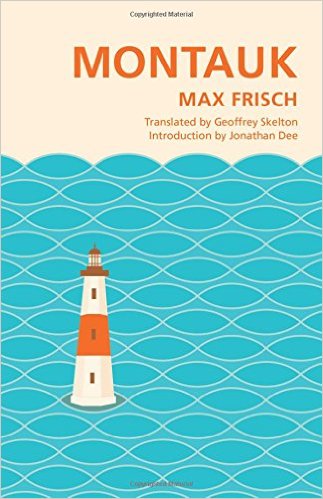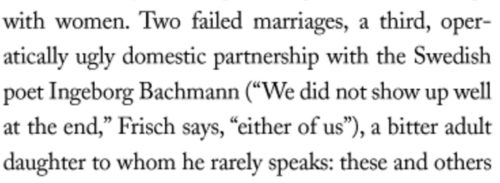Novelistic Sloppiness
On my mind, this morning? Last night’s irritation: I had walked into McNally Jackson, my last (not least) favorite Manhattan bookshop, to browse new books & came upon Max Frisch’s Montauk (which I had reread twice in the last 6 months for a project I had been working on). Somewhat surprised that it had been reissued, I picked it up to see if their was any pressing reason for this. Well, there is a new introduction by novelist Jonathan Dee, so I casually started reading it. I never got to Dee’s explanation of why it was thought useful to reissue this book now, if he actually gave one, as only a couple pages into the intro I came across a serious blunder: Dee explains that Frisch’s book, besides the love affair with his US publisher’s young publicity assistant, is a rumination on, among others, Frisch’s recent horribly failed affair with Ingeborg Bachmann — whom he calls “the Swedish poet.” Bachmann was of course Austrian, and, as anyone even half-educated in European literature knows, the major Austrian writer of the post-WW2 decades. Dee — notorious mainly as the gofer for George Plimpton at the Paris Review — will no doubt know of Thomas Bernhard and possibly Peter Handke. But Bachmann? A woman poet — & thus clearly interesting only as the ex-girlfriend of the Swiss male novelist, so no need to even fact-check who she is. And yet, Bachmann (stopped writing poetry after her first two volumes were published) left us a major prose ensemble (the Todesarten project, including the novel Malina) highly admired by the likes of Thomas Bernhard, that surpasses Frisch’s staid, traditional, irony-clad middle of the road prose-works by a mile. I closed the book, put it back on the shelf & walked away. Such sloppiness, such ignorance! Even a high-schooler with wikipedia could have fact-checked this — and the publisher (Tin House Books) should certainly have done so.



 Poasis II: Selected Poems 2000-2024
Poasis II: Selected Poems 2000-2024 “Todesguge/Deathfugue”
“Todesguge/Deathfugue” “Interglacial Narrows (Poems 1915-2021)”
“Interglacial Narrows (Poems 1915-2021)” “Always the Many, Never the One: Conversations In-between, with Florent Toniello”
“Always the Many, Never the One: Conversations In-between, with Florent Toniello” “Conversations in the Pyrenees”
“Conversations in the Pyrenees” “A Voice Full of Cities: The Collected Essays of Robert Kelly.” Edited by Pierre Joris & Peter Cockelbergh
“A Voice Full of Cities: The Collected Essays of Robert Kelly.” Edited by Pierre Joris & Peter Cockelbergh “An American Suite” (Poems) —Inpatient Press
“An American Suite” (Poems) —Inpatient Press “Arabia (not so) Deserta” : Essays on Maghrebi & Mashreqi Writing & Culture
“Arabia (not so) Deserta” : Essays on Maghrebi & Mashreqi Writing & Culture “Barzakh” (Poems 2000-2012)
“Barzakh” (Poems 2000-2012) “Fox-trails, -tales & -trots”
“Fox-trails, -tales & -trots” “The Agony of I.B.” — A play. Editions PHI & TNL 2016
“The Agony of I.B.” — A play. Editions PHI & TNL 2016 “The Book of U / Le livre des cormorans”
“The Book of U / Le livre des cormorans” “Memory Rose Into Threshold Speech: The Collected Earlier Poetry of Paul Celan”
“Memory Rose Into Threshold Speech: The Collected Earlier Poetry of Paul Celan” “Paul Celan, Microliths They Are, Little Stones”
“Paul Celan, Microliths They Are, Little Stones” “Paul Celan: Breathturn into Timestead-The Collected Later Poetry.” Translated & with commentary by Pierre Joris. Farrar, Straus & Giroux
“Paul Celan: Breathturn into Timestead-The Collected Later Poetry.” Translated & with commentary by Pierre Joris. Farrar, Straus & Giroux
I see similar sloppiness all over, lately. Awful literary translations that aren’t checked–and are praised by critics and blurb-writers who have no idea what they’re talking about. When the poems (for example) are bad poems you ought to be able to conclude that either 1) This is a terrible poet not worth translating 2) If the original is good the translation is failing to convey that (and is damaging the poet’s reputation.)